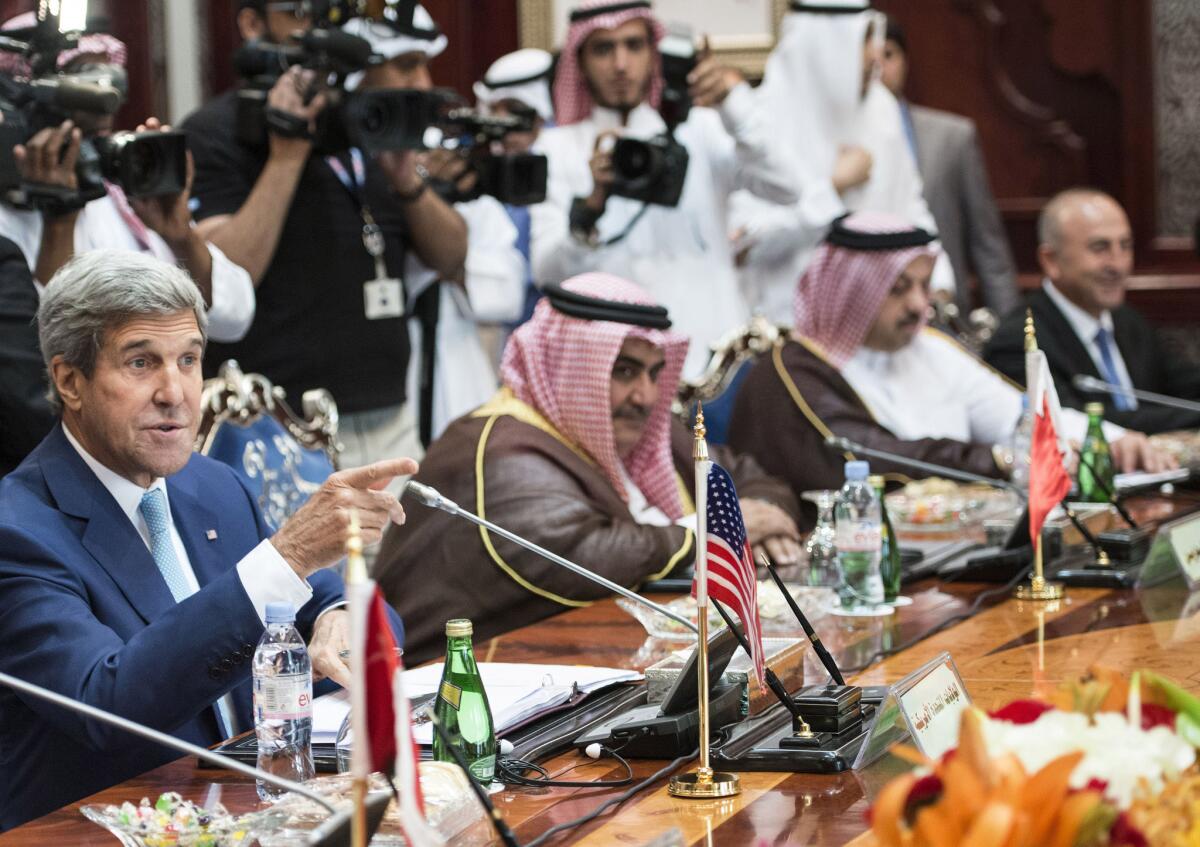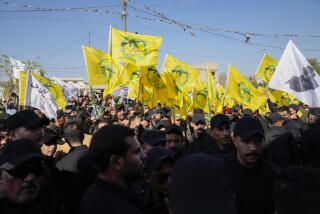U.S. faces uncertain task in building coalition against Islamic State

The coalition taking shape as Secretary of State John F. Kerry launched a recruitment drive Thursday among Middle Eastern states and European allies appears to be broader and more committed than the one mustered for the 2003 invasion of Iraq, but the U.S. must straddle sharp and growing divisions in the Muslim world over whether to combat or accommodate the forces of militant Islam.
Kerry, who held meetings in Saudi Arabia on Thursday ahead of planned trips to Ankara and Cairo, is seeking to stitch together a broad-based Arab resistance against Islamic State’s violent advance in Iraq and Syria, even though governments and citizens from some of the Arab nations he seeks to assemble stand accused of providing logistical and financial support to militant Islamic organizations, including those operating in Syria.
The issue of support to organizations such as Hamas in the Gaza Strip and the Muslim Brotherhood elsewhere in the Middle East has fueled long-standing animosity across the region and now complicates the U.S. efforts at coalition-building, as does the long-standing divide between Sunni and Shiite Muslims that for years has fueled the civil war in Iraq and beset much of the rest of the Middle East.
The difficult political terrain raises questions about how international will be the coalition assembled to attack the Al Qaeda splinter group, which has captured a third of Iraqi and Syrian territory, slaughtered hundreds of political and religious rivals, enslaved women and children, beheaded two kidnapped American journalists and expelled even fellow Sunnis rejected as insufficiently radical.
Only three other nations sent troops for the invasion to topple Saddam Hussein, and some of the claimed 46 members of the “coalition of the willing” sent mere handfuls of contractors for noncombat contributions such as food service and laundry, while others — Palau, the Marshall Islands and Micronesia — didn’t even have standing armies.
Now, President Obama has called for “the broadest possible” participation to destroy the extremists, and U.S. officials hope to enlist as many as 100 countries and militias to conduct airstrikes, coordinate ground operations and halt the influx of funding and foreign fighters aiding Islamic State.
But the more diverse international force for the mission brings with it the complications of an operation riven by the Shiite-Sunni schism, differences among Sunni nations over support to militant Islam, and other competing agendas. Many of the hoped-for participants are firmly aligned with Shiite Iran or Sunni-ruled Saudi Arabia, and their populations are likely to be hostile toward a mission seen as benefiting the other side.
Many Sunni Arab leaders will be wary because they “don’t want to be seen supporting a Shiite-led effort” or being part of a coalition “made in America,” said Dalia Dassa Kaye, a Middle East specialist at Rand Corp.
“It would feed into the ISIS narrative,” she said of the militant group, formerly known as Islamic State in Iraq and Syria.
Administration officials insist that cooperation with Iran is out of the question. Iraqis, Sunni Arab countries, Turks and Israelis would all be deeply alarmed by any hint that Washington and Tehran are working together. So while the United States is keeping Iran informed of its plans in Iraq, officials on both sides insist there will be no partnership.
For Iran’s part, the mistrust and fear of public backlash are mutual.
“Iran does not want to play up the U.S. role against [Islamic State] as serious and decisive,” said Nader Karimi Juni, a political analyst in Tehran.
The White House goal of a cohesive and functional alliance is inspired by broad acknowledgment in Europe and the Middle East that Islamic State is a threat to targets far beyond its claimed caliphate. On the other hand, there is war weariness on the U.S. side after more than a decade of fighting in Iraq and Afghanistan, and America’s NATO allies face other security challenges, foremost among them Russia’s aggression against Ukraine.
France is ready to wage airstrikes against the militants in Iraq and Syria. Saudi Arabia will open its bases to train Syrian opposition fighters. Most Middle East and Persian Gulf states have pledged to support a common stand against terrorism and America’s European allies vow not to stand idly by while Islamic State warriors wreak deadly havoc.
But there were no prospects for mounting an operation under the auspices of the United Nations. Russia, a strong ally of Syria, wields veto power in the U.N. Security Council and would derail any attempt to get the world body’s stamp of approval on a campaign to defeat Islamic State.
In the Sunni strongholds of the Persian Gulf and Saudi Arabia, leaders will be reluctant to condone military action against fellow Muslims, no matter how dangerous or extreme.
The coalition is also attracting participants with starkly contrasting objectives in defeating Islamic State, which is both an outgrowth of the Shiite-Sunni sectarian divide and a driving force in its deepening.
Egypt, with the strong support of Saudi Arabia and the United Arab Emirates, has embarked on a crackdown against the region’s oldest Islamist group, the Muslim Brotherhood. Turkey and Qatar, to the fury of Cairo, continue to support the Brotherhood and other militant groups such as Hamas, fresh from its confrontation with Israel in Gaza.
During his meetings with Middle East diplomats in Saudi Arabia on Thursday, Kerry sought assurances from Qatar and UAE officials that they would make greater efforts to stem funding from wealthy radicals to the extremists. He was also expected on Friday to press Turkish President Recep Tayyip Erdogan to stop the flow of foreign fighters in and out of Syria, to which Ankara has turned a blind eye in its desire to see the militants defeat Syrian President Bashar Assad.
The Western-backed Syrian National Coalition responded to Obama’s call for a unified fight against Islamic State with vows of being a “ready and willing” partner. But the moderate, predominantly Sunni fighters insist the campaign also needs to target Assad, whom they have been trying to overthrow for more than three years.
Iraq’s Kurdish population, another U.S. ally that can be vital in coordinating air assaults, also has expectations of gaining control of more of the country’s oil assets once Islamic State is defeated or driven out.
Other countries that Washington has counted on for support in previous campaigns appear to be leaning against joining the newest coalition.
Even staunch U.S. allies appear undecided. British Foreign Secretary Philip Hammond on Thursday ruled out any Royal Air Force participation in airstrikes, only to be overruled hours later by Prime Minister David Cameron, who said all options remained under consideration.
Williams reported from Los Angeles, King from Cairo and Richter from Washington. Times staff writer Patrick J. McDonnell in Beirut and special correspondent Ramin Mostaghim in Tehran contributed to this report.Follow @cjwilliamslat for the latest international news 24/7
More to Read
Sign up for Essential California
The most important California stories and recommendations in your inbox every morning.
You may occasionally receive promotional content from the Los Angeles Times.












